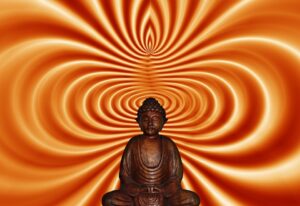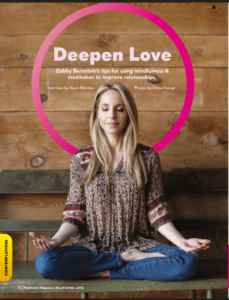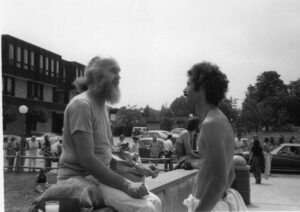WARNING: This article will teach you how to generate happiness at will, and be completely happy all the time. This may seem like a good thing, but keep in mind that this power is very dangerous if you don’t know how to control it.
Choosing to Be Happy
We are as happy as we decide to be.
– Abraham Lincoln
WARNING: This article will teach you how to generate happiness at will, and be completely happy all the time. This may seem like a good thing, but keep in mind that this power is very dangerous if you don’t know how to control it. Just like any drug, happiness can become an addiction. Addiction is characterized by using a drug in a way that is maladaptive. Many people who learn how to be happy all the time lose all desire to make money, get resources, and do all the things that we are evolutionarily programmed to do, because they’re just happy with the way things are. They often end up becoming happy homeless hippies, starving artists, or (if they’re smart) Buddhist Monks. Most of them don’t have children, contribute much to society, or live lives in line with their evolutionary destinies. This is the definition of “maladaptive.” Please read my article “Stop Trying To Be Happy” before you read this one. You have been warned. Read on at your own risk.
What is Happiness?
True happiness is the state of being free of fear & desire. It is the state of fearlessness and desirelessness.
If you are in fear of something (pain, for example), you will always be preoccupied, to some extent or another, with avoiding it. If you desire something (money, for example), you will always be preoccupied, to some extent or another, with seeking it.
If there is nothing that you fear, and nothing that you desire, you don’t have to seek or avoid anything. You can completely relax, into the simple enjoyment of the present moment.
When the mind is empty, it is in a natural state of peace. At the core, all minds generate a deep, peaceful happiness. Like a golden glow shining from the depths of your mind, this happiness can shine through and pervade every moment of your life, as long as there is nothing obstructing it.
The only thing that stops this golden glow from shining through and making you feel happy all the time, are the grey clouds of thought that arise from the “unsatisfactory” feelings of “wanting something” and “being afraid of something.”
When you don’t want anything, and you’re not afraid of anything, the golden glow of happiness will naturally shine through.
Many people take vacations to get away from stressful situations that are filled with fear and desire, seeking and avoiding. Some use psychoactive chemicals (drugs), intimate relationships, or adrenaline sports to temporarily relieve anxiety. However, these things offer only limited and temporary relief. Even on vacation, you have a little anxiety-voice somewhere in the back of your mind telling you that you have to go back to work in three days (fear of loss, desire for gain).
When you are still holding onto your evolutionary impulses of fear & desire, when you still consider them to be your friends instead of your enemies, you will always have some anxiety and stress that interfere with your ability to be 100% happy at any given time.
The Two Approaches To Happiness
There are two general approaches to happiness; let’s call them “Type A” and “Type B.”
Type A: The “Satisfaction” Approach
The Satisfaction Approach is very popular in Western (American / European) Culture.
Goal: “Get what you want.”
Method: Use action to obtain happiness in the future.
Values: Desire & Power; the drive & ability to “get what you want.”
This is the way of the animal; ancient, natural, and evolutionary.
In the Satisfaction Approach to happiness, we recognize that (a) everyone has fears and desires, (b) fears and desires burn inside of us, unpleasantly, until they are quenched, and (c) when our fears are eliminated and our desires are satisfied, we feel, at least for that moment, a sense of “happiness.”
Therefore, we do what we can in the physical world to eliminate the objects of our fear, and obtain the objects of our desire.
At the moment of eliminating the object of fear, we feel fearless. At the moment of obtaining the object of desire, we become desireless. Free of fear and desire, we don’t have to think about how to “solve” the situation anymore. When those clouds of thought clear out of the mind, the golden light of happiness shines through and pervades our conscious experience.
This entire process is largely unconscious. When we have fears and desires we tend to take them for granted, as if “that’s just the way things are.” We seek and avoid like robots, and just assume that this is what we’re “supposed” to be doing.
Most of us never consciously realize that the thing we are truly seeking with all of this ACTION in the external world, is simply the happiness that arises when our fears and desires fade away. Those who do realize this, and see it clearly within themselves, break the evolutionary cycle of seeking and avoiding in the external world. They tend to drop out of the rat race and become mystics, like Abraham, Jesus, Buddha, and Eckhart Tolle.
Type B: The “Contentment” Approach
The Contentment Approach is more popular in Eastern (Hindu / Buddhist) Culture.
Motto: “Don’t worry. Be happy.”
Method: Fearlessness & Desirelessness, in the present moment.
Values: Life, love, happiness, kindness, acceptance.
This is the way of the mystic; timeless, transcendent, and profound.
In the Contentment Approach to happiness, we recognize that (a) everyone has fears and desires, (b) fears and desires burn inside of us, unpleasantly, until they are quenched, (c) when our fears are eliminated and our desires satisfied, we feel, at least for a moment, a sense of “happiness,” and (d) by simply letting go of the feelings of fear and desire as they arise, we feel this sense of happiness ALL THE TIME.
It is only our tendency to grasp at, hold, and cling onto our fears and desires that causes unhappiness in the first place.
We actively generate unhappiness. In the West, we are taught to think that happiness is active and unhappiness is passive, but really it’s the other way around.
We don’t need to go through days, months, and years of “work” to achieve a few minutes, days, and weeks of happiness. Instead, with just a little bit of practice, we can just be unconditionally happy, all the time.
In the Contentment Approach to happiness, we are mindful of our inner worlds at every moment. When we notice the arising of fear and desire, we observe how they stir up the clouds of thought which block out the golden light of our happiness. When we observe this enough times, our minds simply give up on the whole “fear & desire” thing. We realize that they are enemies to our happiness, not friends, and we no longer welcome them into our inner worlds.
For as long a we maintain this mindfulness, this watchful awareness, the golden light of happiness is allowed to shine through. Over time, we become accustomed to happiness (the brain physically changes, a phenomenon called neuroplasticity). We form the habit of being happy. Fear and desire arise less and less often, and we become “Buddhas,” the godlike incarnation of the “happiness potential” of Man.
When it comes to happiness, Type B wins by a landslide. Type A can’t keep up; he’s too busy working toward happiness to actually be happy. But, do keep in mind that Type A will tend to win in the evolution game, as he truly believes his happiness depends on it.
Evolutionary Implications
This does not mean that you cannot be “Type-B Happy” and also play the evolution game at the same time. You just have to be careful not to associate your evolutionary duty with your naturally occurring evolutionary fears and desires.
If you want to be happy and successful at the same time, you need to recognize that your evolutionary duty (your destiny) is simply to take actions that move you toward your evolutionary goals (money, power, resources, and offspring) and support the greater good of the world. That doesn’t mean you actually have to be successful, just that you TRY to be successful.
When you keep your fears and desires out of the equation, your evolutionarily adaptive actions become a part of your naturally happy lifestyle. When you disconnect your physical evolutionary destiny from your emotional fears and desires, your happiness is no longer contingent upon success and failure. It just shines through all the time, no matter what happens.
This makes you essentially indifferent to the outcome, which is precisely the reason that evolution did NOT design us this way.
Evolution, INTELLIGENTLY, designed us to be deeply affected by our fears and desires, so that our happiness becomes conditional upon fulfilling our evolutionary imperatives. Naturally — just like all the other animals — we are slaves to our evolutionary instinct to avoid what we fear and seek what we desire. There is no better incentive to enforce this slavery than the whip of unhappiness and the reward of happiness.
This is why Type A will tend to win in the evolution game; he truly believes his happiness depends on it.
You may be interested to know that Type B actually has one major advantage over Type A in the evolution game, when both are playing with the same amount of time and intensity.
Type A players become emotionally involved in everything they do (which is what gives them so much motivation and intensity). Type B players, on the other hand, are fearless and desireless, and thus able to maintain objectivity at all times.
This objectivity allows Type B players to make better decisions, based on logic instead of the emotions of fear & desire. With all the emotions and thoughts swirling around in the Type A mind, he can have a hard time focusing and thinking as clearly as the Type B player.
Productivity and Societal Implications
The Type A player has the powerful incentives of fear and desire driving his actions. Thus, he has more of an emotional fire under his ass to work hard. He puts long hours and tireless intensity into fulfilling his goals. This makes him what we might call “productive.” Better said, he is a “hard worker.” He is a slave to his emotions, and he works like it.
The Type B player, on the other hand, has a much less powerful motivation to work. In fact, as I mentioned in the warning at the beginning of this article, many have no motivation whatsoever… they are happy with the way things already are.
The Type B player is happy, and thus feels no need to work for himself. However, there are two things that can motivate the Type B player to be just as productive as the Type A, if not more productive, without resorting to neediness and emotionality. These two things are the complementary senses of Moral Duty and Evolutionary Destiny.
The senses of moral duty and evolutionary destiny are less in-your-face than the emotions of fear and desire.
Our evolutionary destiny is to continue the great tradition of life into which we have all been born. Every single one of your ancestors engaged in activities to promote survival, reproduction, and the development of their offspring. Now it’s your turn to continue the cycle. This is your destiny, it is biologically ingrained in your genes. No matter how hard you try, you cannot change who you are. You cannot escape your evolutionary imperatives, and it is futile to try. You are destined do what you can to continue the cycle. You can still be Unconditionally Happy while doing this, as long as you don’t fear failure and desire success. You can be emotionally indifferent to success and failure, yet still act in line with your evolutionary destiny at the same time.
Through the sense of moral duty, we are compelled to take actions that are in line with the greater good… to lend our hands and minds to those who need our help. Ghandi, for example, worked tirelessly and intensely to improve the political situation in his country. He did not do this for his own happiness; rather, he did it out of a sense of moral duty to his fellow men. If his happiness had been tied to the elimination of fear and the satisfaction of desire, he would not have been able to put himself through the danger and deprivation that he did in the years of his service to his country. His power came from the fact that he was conscious of his human emotions, and his ability to transcend them in the fulfillment of his duty.
Again, I must reiterate the importance of focusing on the actions themselves, and not the results. Once you begin to fear one outcome and desire another, you cut yourself off from the golden light of happiness. When this happens, your actions once again become driven by the emotional incentive of happiness. You become conditionally happy, instead of unconditionally happy. You are coming from the Satisfaction Approach again. You lose the benefits of the Type-B Happiness. Worst of all, the noble senses of Destiny and Duty are once again overshadowed by the selfish emotions of Fear and Desire.
This is a very difficult balancing act, focusing on the actions instead of the results. You must know what result you aim to achieve, but at the same time NOT PREFER IT over any other result. This is a very thin line to walk indeed. Many try, and fall off the tightrope. Many consider it a futile endeavor, and don’t even begin to try (once again, see the warning at the beginning of this article).
The unsolvable problem here, unfortunately, is that once you “decide” to act through moral duty and evolutionary imperative, you are already creating a preference for one outcome over another. You are desiring one outcome. It is not possible to decide to act without desire, because decisions stem from desire in the first place.
Moral duty and evolutionary imperative are based on primal instincts in the present moment, not logical decisions about the future.
In order to make a conscious decision, you have to want something first. Acting on instinct, on the other hand, is simply the movement of the body. Instinctual action does not require wanting, because behavioral instincts are even more primal than emotional ones.
Now that you have become conscious of the concepts, you will not be able to use them until you stop caring about them (again, see warning above). It’s an ironic catch-22. This is the reason that people like Buddha, Jesus, and Eckhart Tolle dropped off the map for long periods of time after becoming enlightened, before returning to society to help the people around them. If they had returned right away, it would have been because they WANTED to ACCOMPLISH something. But they didn’t. They let go of the desire to accomplish anything. Eventually, they happened to wander back into society and help the people around them. They had no choice. If they did, it wouldn’t have worked.
When a person acts truly out of duty and destiny, the results are much better than when he acts out of fear and desire.
Economic Impact
When a person has a career based truly on his sense of moral duty, he works for the betterment of his society. His actions are all geared to making the world a better place. When a person has a career based on evolutionary fear and desire, on the other hand, he works mainly out of self-interest. His actions are more in line with his bank account than with the best interests of the society.
In my area (NYC), the effects of action spawned by fear and desire are readily apparent. All it takes is a walk down Wall Street to see the greed in the eyes of the most “productive,” hardworking people in the world.
Day traders and stock brokers, who play in the stock market all day, epitomize self-interest-centered productivity. They work extremely intense, extremely long days. During my time on Wall Street, one of my friends worked at a stock brokerage firm at 14 Wall Street that required brokers to put in 16 hour days, with no lunch breaks (eat at your desk). Others are working full time as day-traders, focusing intently, gambling on intraday stock fluctuations on their home computers for 14 hours a day.
All these people are doing is gambling in a big, government-sanctioned casino. They may be working hard and making a lot of money for themselves, but they’re far from productive, in an economic sense. One of the major reasons that the United States economy is going down the drain is because so many of our hard-working people are doing things that aren’t producing anything of actual value. On a world scale, this has been getting worse and worse over the past couple of centuries, and it is leading to major economic crises like the one we are experiencing today.
People who are driven by a combination of moral duty and evolutionary destiny, instead of self-centered fear and desire, tend to take up more noble occupations. These are our doctors, engineers, firefighters, teachers, and farmers. They may not work as hard as the stressed out, money-hungry army of day traders and stock brokers… but the work that they do saves lives, builds cities, and puts food in peoples’ mouths.
No matter how much more intensely the day trader works, the engineer is infinitely more productive. Because the engineer actually produces things.
Maintaining non-emotional motivation and unconditional happiness at the same time is not an easy line to walk. Most people who have learned to enjoy everlasting happiness through the Type-B approach quickly lose their balance, and simply stop trying. If you want to try it, just remember to focus on the actions instead of the results, the path instead of the destination, the Now instead of the Future.
Good luck!
Implications for Personal Relationships
Unconditional Happiness affects your personal relationships in pretty much the same way it affects your societal impact.
When you are driven by fear & desire, you are motivated to find a high-quality mate, and to make your “evolutionarily advantageous” relationships work. You therefore do everything you can to improve the relationships that benefit you, and ignore the ones that don’t. This leads to relatively shallow, self-serving relationships where you are using the people around you, instead of loving them.
You are also easily hurt by the people you love *cough*need*cough*. When they do things that trigger your fears, or that are not in line with the fulfillment of your desires, it interferes with your happiness, and actually stops you from being happy for that moment.
When you are unconditionally happy, when your happiness is not tied to fear and desire, it instead shines through at every moment without being affected by the circumstances around you. You therefore have much less motivation to “seek out” a high-quality mate. You have less of a drive to “make your relationships work.” After all, you’re happy with or without them.
However, just like happiness shines through in a mind free of fear and desire, so does love. Love is basically happiness, directed outward. Love and happiness are made of the same stuff, and are generated by the same area of the brain. When you are a “happy person,” you radiate positive energy. People want to be around you. You also feel a deep sense of love toward everyone around you, people, animals, even insects and plants. When you love people and they love you, personal relationships don’t require any work. They are simply a joy, flowing out of your happiness, a natural part of your unconditionally happy lifestyle.
How Does Meditation Fit In?
Meditation makes a person happier, by sliding him from the Type A to the Type B side. Meditation is, essentially, a way to create the power of prolonged attention and concentration that is the prerequisite for your ability to be mindful as described above.














